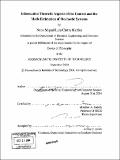Information theoretic aspects of the control and the mode estimation of stochastic systems
Author(s)
Martins, Numo Miguel Lara Cintra, 1972-
DownloadFull printable version (5.382Mb)
Other Contributors
Massachusetts Institute of Technology. Dept. of Electrical Engineering and Computer Science.
Advisor
Munther A. Daleh.
Terms of use
Metadata
Show full item recordAbstract
(cont.) parallel with a communication paradigm and deriving an analysis of performance. In our approach, the switching system is viewed as an encoder of the mode, which is interpreted as the message, while a probing signal establishes a random code. Using a distortion function, we define an uncertainty ball where the estimates are guaranteed to lie with probability arbitrarily close to 1. The radius of the uncertainty ball is directly related to the entropy rate of the switching process. In this thesis, we investigate three problems: the first broaches the control under information constraints in the presence of uncertainty; in the second we derive a new fundamental limitation of performance in the presence of finite capacity feedback; while the third studies the estimation of Hidden Markov Models. Problem 1: We study the stabilizability of uncertain stochastic systems in the presence of finite capacity feedback. We consider a stochastic digital link that sends words whose size is governed by a random process. Such link is used to transmit state measurements between the plant and the controller. We derive necessary and sufficient conditions for internal and external stabilizability of the feedback loop. In addition, stability in the presence of uncertainty in the plant is analyzed using a small-gain argument. Problem 2: We address a fundamental limitation of performance for feedback systems, in the presence of a communication channel. The feedback loop comprises a discrete-time, linear and time-invariant plant, a channel, an encoder and a decoder which may also embody a controller. We derive an inequality of the form L ̲>[or equal to] [epsilon]max ... - C[channel] where L ̲is a measure of disturbance rejection, A is the open loop dynamic matrix and Cchannel is the Shannon capacity of the channel. Our measure L ̲is non-negative and smaller L ̲indicates better rejection (attenuation), while L ̲= 0 signifies no rejection. Additionally, we prove that, under a stationarity assumption, L ̲admits a log-sensitivity integral representation. Problem 3: We tackle the problem of mode estimation in switching systems. From the theoretical point of view, our contribution is twofold: creating a framework that has a clear
Description
Thesis (Ph. D.)--Massachusetts Institute of Technology, Dept. of Electrical Engineering and Computer Science, 2004. Includes bibliographical references (leaves 131-137).
Date issued
2004Department
Massachusetts Institute of Technology. Department of Electrical Engineering and Computer SciencePublisher
Massachusetts Institute of Technology
Keywords
Electrical Engineering and Computer Science.